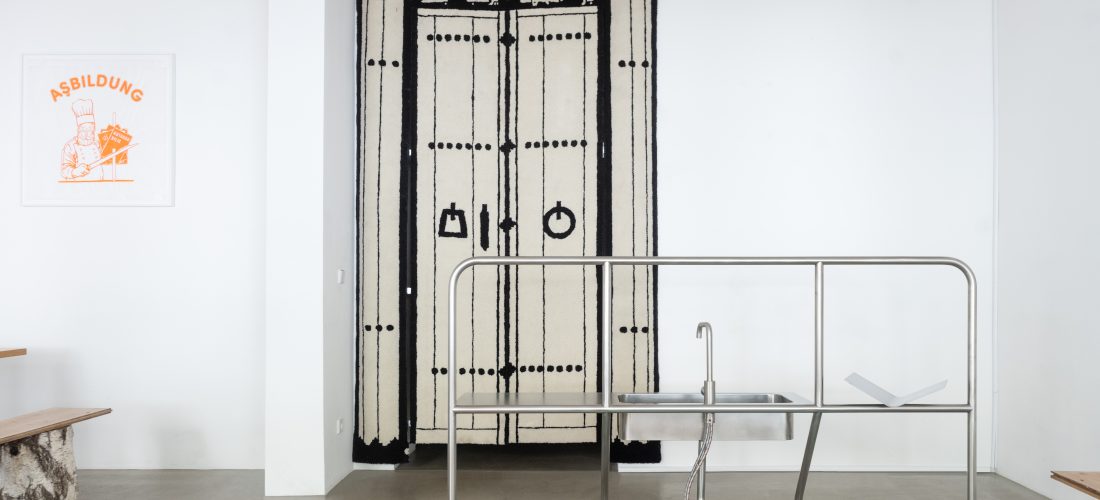LOCATION :
Slavs and Tatars Studio, Berlin
WHO CAN PARTICIPATE:
Curators and interdisciplinary researchers and practitioners based in KSA, who have professional experience of at least 5 years in the art field. The ideal candidate would be willing to expand their curatorial practices, have an interest in performance, publishing, and/or knowledge production within a collaborative environment.
Candidates will be judged on the quality of their work, experience, research interests and motivation to integrate Slavs and Tatars’ studio and Pickle Bar.
CONDITIONS:
Duration: May 13 – July 12 (2 months) in Berlin
Resident receives :
- Covers of the travels expenses: return airfare, visa costs, travel health and liability insurance
- A monthly stipend of 600 EUR; 1200 EUR for two months, to cover living expenses, trips and local expenses
- The cover of transport costs in Berlin up to 100 EUR per month
- Accommodation in a fully equipped and furnished 1 room residency Appartement in the same street as Slavs and Tatars’ studio
- A working desk at Slavs and Tatars’ Studio
Slavs and Tatars and Pickle Bar offer:
- Slavs and Tatars offers the Resident a professional placement within their practice to gain skills relevant to their profession (curatorial, artistic, art management, artwork production, design, research, writing) on both a theoretical and practical level;
- Supervision by the artists and the members of the Slavs and Tatars’ studio and Pickle Bar in gaining practice experience within a collective’s studio work;
- Introduction to the local actors of Berlin’s and Germany’s art scene, contacts to partner institution and project spaces;
Publicity and communication on the Resident own projects via a short biography of the Resident on Slavs and Tatars’ webpage and social media - Critical feedback for an ongoing project of the Resident (introduction to the local context of Berlin, arranging relevant meetings, information, and literature research assistance);
The Goethe-Institut proposes:
Administrative support into the visa process
The resident is expected to :
- Prepare a presentation (15-20 min) to his/her practice to the studio members (within the first 10 days of the residency)
- Participation in Slavs and Tatars’ studio activities 3 days per week;
- Help in development, research and/or production of studio practice: public program, publication, exhibitions.
- Organize one public event, lecture, or performance based on his/her own artistic practice, research or lines of inquiry atPickle Bar project space in Berlin at the end of his/her stay;
- The resident upon return will have the opportunity to further develop on their research, and have access to facilities at Hayy Jameel, as well as curatorial guidance towards an outcome, be that a presentation, performance and (or) knowledge sharing with members of the creative community in Jeddah.
APPLICATION SUBMISSION
- All applications will be treated with discretion and anonymity. The selection will be made based on the quality of the work, the experience of the candidate, the coherence of the current projects with the collective practice.
- Each application submitted will be reviewed by a jury composed of 1 member of Art Jameel, 1 member of the Goethe Institut KSA, the coordinator of the residency program at Slavs and Tatars’ studio, and one of the co-founders of Slavs and Tatars.
Application requirements:
- CV
- A motivation statement of one page maximum
- A portfolio with visuals, or a selection of texts, highlighting three current and/or past projects that demonstrates the lines of inquiry of the candidate
Please submit your application here
ABOUT SLAVS AND TATARS & PICKLE BAR
Slavs and Tatars is an internationally renowned art collective devoted to an area East of the former Berlin Wall and West of the Great Wall of China known as Eurasia. Since its inception in 2006, the collective has shown a keen grasp of polemical issues in society, clearing new paths for contemporary discourse via a wholly idiosyncratic form of knowledge production: including popular culture, spiritual and esoteric traditions, oral histories, modern myths, as well as scholarly research. The collective’s practice is based on three activities: exhibitions, publications, and lecture-performances. Their work has been the subject of solo exhibitions at the Museum of Modern Art, NY; Salt, Istanbul; Vienna Secession, Kunsthalle Zurich and Albertinum, Dresden, among others. Slavs and Tatars has published more than ten books to date, including Wripped Scripped (Hatje Cantz, 2018) on language politics; as well as a translation of the legendary Azerbaijani satirical periodical Molla Nasreddin (currently in its 2nd edition with I.B Tauris, 2017). The artists work across cycles, where extended periods of research give life to an ecosystem of installations, sculptures, lectures, and printed matter that question our understanding of language, ritual and identity. Imbued with humor and a generosity of spirit, their work commonly blends pop visuals with esoteric traditions, oral rituals with scholarly analysis in a way that challenges our oftentimes one-dimensional way of seeing relationships between science, religion, power, and identity. In addition to launching a residency and mentorship program for young professionals from their region, Slavs and Tatars recently opened Pickle Bar, a slavic aperitivo bar-cum-project space a few doors down from their studio in Moabit.
Pickle Bar is a non-profit project space, that focuses on research, performances and discussions, situated in Berlin’s Moabit district launched in 2020 by artist collective Slavs and Tatars with curators Patricia Couvet and Anastasia Marukhina to extend the collective’s Eurasian platform (Eastern Europe, the Caucasus and Central Asia) to a greater public. Dedicated to an unlikely form of knowledge production – one where hospitality and discourse are inseparable – Pickle Bar addresses items of urgency, through deep dives into often-overlooked areas of study in oral and cultural histories, material culture, language and gender studies. Pickle Bar invites other artists, thinkers, writers, and researchers to explore the limits of ideologies and the edges of belief systems with a particular focus on language, both as affect and discourse, as fermentation cuts across both.

 Shop
Shop
